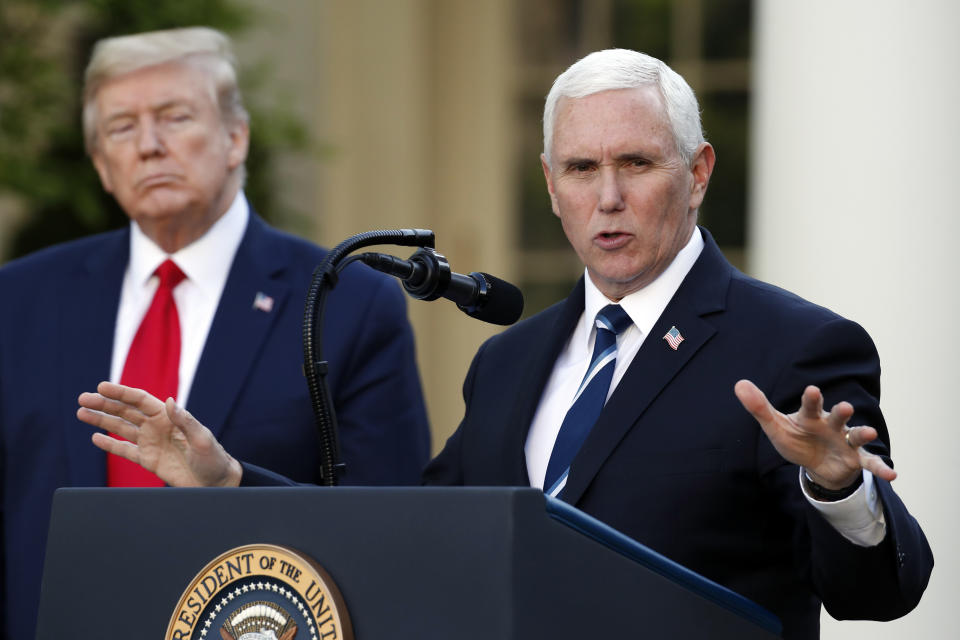Video: Mike Pence showers praise on Trump's leadership in pandemic
For the last two months, Vice President Mike Pence has been the public face of the administration’s response to COVID-19, second only to President Trump himself. In choosing his vice president for the tremendous responsibility of heading the White House coronavirus task force, Trump paid tribute to Pence as “very good on health care ... really, very expert at the field,” which presumes that since 2000 he no longer believes that “despite the hysteria from the political class and the media, smoking doesn’t kill.”
More recently, as governor of Indiana in 2015, Pence came under intense criticism for his reluctance to lift a ban on the distribution to the public of sterile needles in the face of the largest outbreak of HIV in years among opioid addicts in one rural county.
But whatever his qualifications in the field of public health, Pence has demonstrated one crucial ability for his post: to sprinkle every public utterance, in his trademark voice of soothing, earnest reasonableness, with the phrase “Under your leadership, Mr. President...”
Or some variation thereof: Sometimes he credits the president’s “guidance” or “direction” for the tremendous success he claims for the pandemic response, or he lavishes praise on American industry and the public for answering the president’s “call.” Almost the first words out of his mouth as he took the podium for his appointment, on Feb. 26, were a tribute to how “from the first word of an outbreak of the coronavirus, the president took unprecedented steps to protect the American people from the spread of this disease.”
Two months later, with more than 60,000 dead, that praise has continued undiminished.

Over the succeeding weeks, the vice president credited Trump with leadership in “providing all the nation’s governors and all of their health officials with detail about the testing infrastructure that exists all around the country,” which would seem like a fairly routine responsibility of the task force Pence himself heads. On the same day, he announced that the United States would undertake, “under the president’s leadership, an effort around nursing home transparency.” And as if that wasn’t enough leadership for one day, Pence went on to boast that “under the president’s leadership, we’ve put out over $90 billion in accelerated payments under the Medicare program, provided $30 billion of grants, with more dollars on the way.”
The program of accelerated payments was implemented by the administration’s Centers for Medicare & Medicaid Services. A week after Pence made those remarks, CMS suspended the program, leading the American Medical Association to urgently demand it be restarted to keep medical practices solvent during the pandemic.
As the author Michael Wolff wrote in his 2018 Trump exposé, “Fire and Fury,” flattery is the currency in the Trump White House, the only reliable path to the president’s ear and a necessary practice for any official who wants to keep his or her job. Pence, who owes his elevation to Trump’s whim in picking him as a running mate, and whose continuation in his job is dependent on the president’s goodwill, has taken advantage of the spotlight to hone his considerable skills in this area.
But Pence is only following in the footsteps of some of his illustrious predecessors, including the first vice president, John Adams, whose idea it was to call the chief executive “His Elective Majesty” rather than the title George Washington chose, president of the United States. Of course, when it comes to praising Trump, Pence has had a good role model to learn from: the “hardest working president in history,” the man in the White House himself. Nobody does it better.
Video produced by Dean Arrindell.
_____
Click here for the latest coronavirus news and updates. According to experts, people over 60 and those who are immunocompromised continue to be the most at risk. If you have questions, please refer to the CDC’s and WHO’s resource guides.
Read more:



